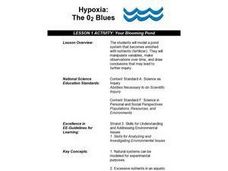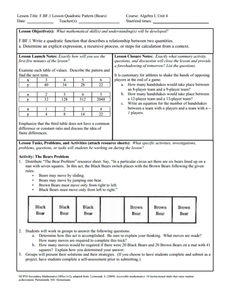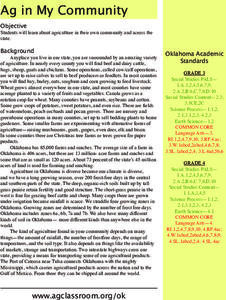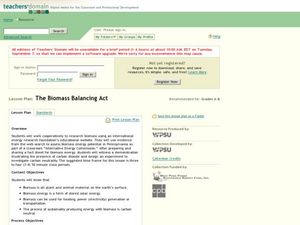Curated OER
Goals of the Diversity of Life Unit
Students are introduced to the unit on the importance of diversity of life and the role that interdependence plays in our worlds. this is part of a multi-lesson unit on the diversity of life.
Curated OER
The Everyday Lives of Arkansas Slaves
Eighth graders become aware of the various aspects of daily activities in the lives of Arkansas slaves. They write answers to questions and prepare a transparency to share with the class that illustrates the topic being researched.
Curated OER
Your Blooming Pond
Pupils model a pond system that becomes enriched with nutrients (fertilizer). They manipulate variables, make observations over time, and draw conclusions that may lead to further inquiry. They, in groups, simulate a pond environment.
Curated OER
The Transformation and Use of Different Types of Energy Using Local Flora and Fauna in a Vietnam Village Setting
Eighth graders examine the concept that the sun is the ultimate source of energy for living things. They conduct an experiment in which they roast marshmallows over a flame that has been produced from methane gas, which originates from...
Curated OER
Bears
Students complete a variety of bear-related activities. They sort and graph teddy bears, distinguish between real and non-real bears and research bear life cycles and habitats.
Curated OER
Growing a Garden
Young scholars research aspects of gardening including nutrition, costs, and soil preparation. They then write a report detailing the planning of the garden and compare costs to buying the items.
Curated OER
Leaving Home
Young scholars explain the importance of larval dispersal and retention to populations. They collect data on organisms and examine it.
Curated OER
Agriculture
Students examine the types of agriculture in their own state and in their local community. They examine how food makes it to their local grocery store. They compare data from different states.
Curated OER
Rainforest Deforestation and the Water Cycle
Students create terrariums (mini rainforests). They observe and discuss the life processes that occur in their terrariums and how changes in these processes affect the plants and organisms inside. They collect and graph data and present...
Curated OER
Charge It!
Pupils complete an experiment using balloons to help them examine the concept of static electricity. They discover how engineers use this information to create better air filters for homes. They describe how to charge an insulator as...
Curated OER
Mountains in the Sea Exploration No Escape
Young scholars study data to hypothesis about the influence of a water circulation cell on the retention of benthic invertebrate larvae in the area of a seamount. They investigate the positives and negatives of larvae retention in this...
Curated OER
Traditional Chinese Garments And Their History
Students examine the traditional dress of the Chinese people and create a new story line for "The Emperor's New Clothes" set in China. This creative project allows students to illustrate pages for the new class book.
Curated OER
Gifts From China To The West
Students identify Chinese inventions that are widely used today and explore how
these inventions influenced social development in the West in this Social Studies lesson using cooperative learning techniques.
Curated OER
Marketing the New Hybrids
High schoolers work together to develop a hypothesis on the natural and applied hybridization of certain species in an ecosystem. Using the internet, they research this topic and read any recent articles or studies. They must note the...
Curated OER
Gale's Curriculum
Seventh graders develop an understanding of Southeastern Asian culture. They increase knowledge of world geography in relation to Southeast Asian countries. Students research a variety of Southeast Asian animals and habitats to be used...
Curated OER
The Biomass Balancing Act
Students work in groups to research biomass using the International Energy Agency's website. Students use evidence from the web search to assess biomass energy potential in Pennsylvania as part of a classroom "Alternative Energy...
Curated OER
Invasive Species
Students use the Internet to research non-native plants that exist in their local community. Using this information, they analyze the invasive species effect on their environment. In groups, they plan and execute their own project to...
Curated OER
Goobers. Goobers? Goobers!
Students begin the lesson by noting the many ways in which to use peanuts. In groups, they use the internet to research the work of George Washington Carver. They discover the allergies and nutritional information of the peanut and...
Curated OER
VS.3e
Third graders explore, examine and identify the importance of the arrival of Africans and women to the Jamestown settlement. They review the groups of people in Virginia during the early 1600s and explain how having a government brought...
Curated OER
Breaking News English: Iran Resumes Nuclear Work
In this English worksheet, students read "Iran Resumes Nuclear Work," and then respond to 47 fill in the blank, 7 short answer, 20 matching, and 8 true or false questions about the selection.
Curated OER
The Great Hungarian Toxic Disaster
Ninth graders examine the the toxic spill in Hungary. In this Hungarian lesson plan, 9th graders read an article and answer guided questions. Students write an email to their teacher explaining the causes and effects of the Toxic disaster.






















